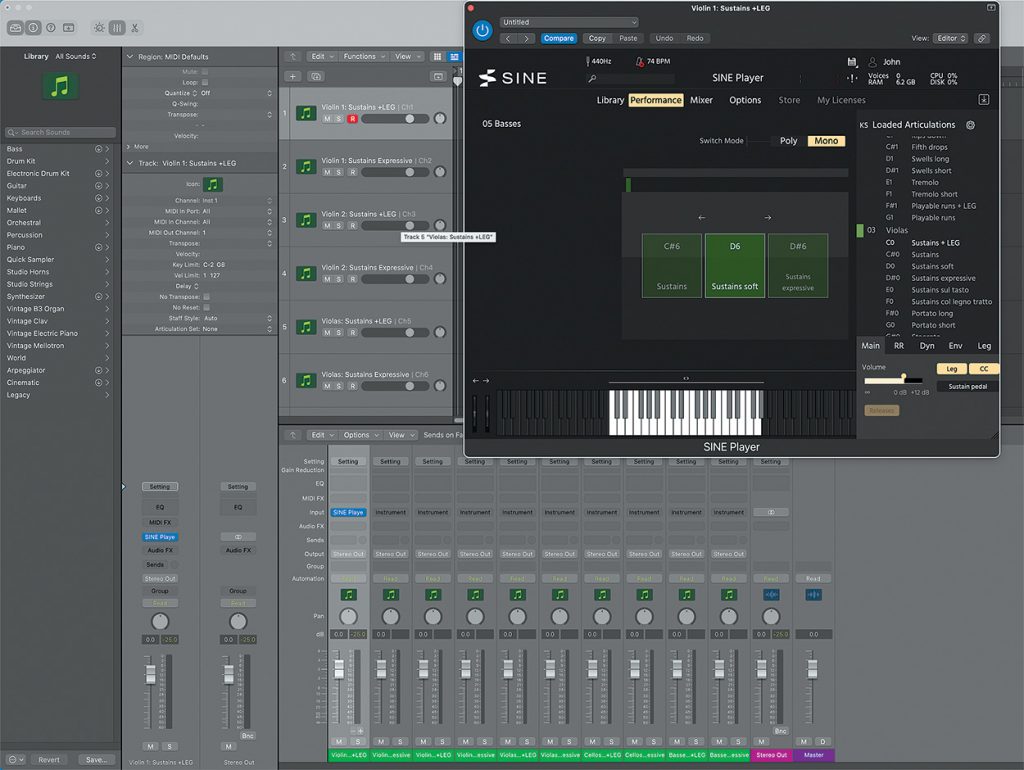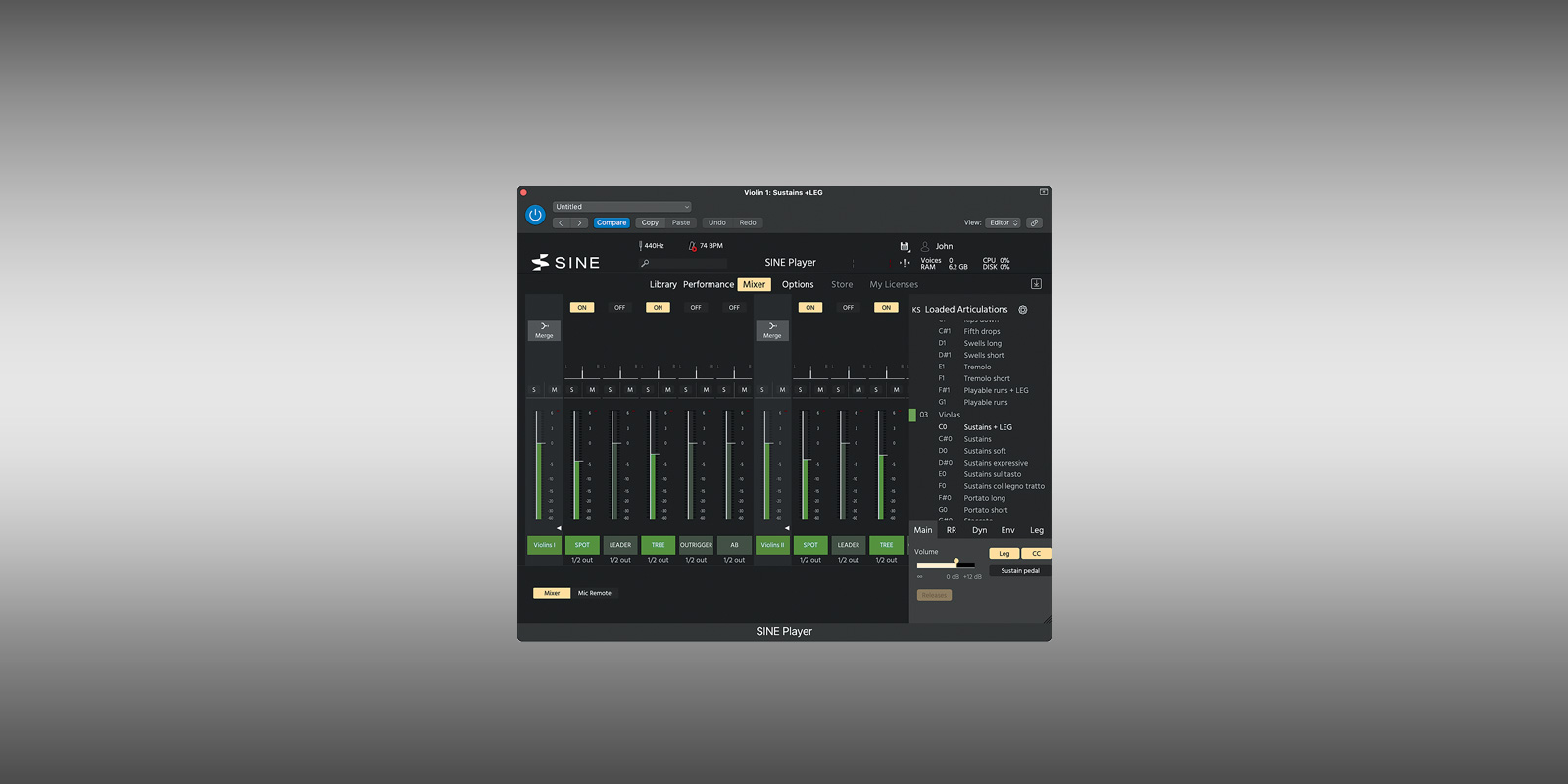This is perhaps the most comprehensive muted string library available
Review by John Czerwinski
For almost 20 years, Berlin-based Orchestral Tools has been creating outstanding virtual instruments for music production. Their flagship Berlin Strings library has been an ambitious work in progress for the last several years that includes the foundational Berlin Strings and Berlin Symphonic Strings libraries, but also offerings like Special Bows 1 and 2, First Chairs and Strings SFX. Berlin Con Sordino Strings (BCSS) on review here rounds out the preceedings quite nicely with a comprehensive offering of muted strings.
Muted Strings
For those unfamiliar with the term, ‘con sordino’ means ‘with mute’ and is used to define a playing style across a number of instruments, most notably strings and brass. Mutes for strings can either be rubber or wood, and are placed across the strings directly on the bridge when in use. In short, playing with a mute makes the instrument a bit quieter and suppresses the instrument’s higher overtones, causing a gentle, warm and rich timbre. Since the player can still employ a full range of bowing techniques with the mute engaged, a diverse sonic palette can be achieved.
Some string libraries offer a con sordino option as an addition to their main library. On the other hand, the vision of Orchestral Tools was to design a full-scale, stand-alone library around the technique with a full range of articulations, thus producing the most comprehensive offering available on the market.
Past Featured Reviews
- April 2024: Ableton Live 12
- March 2024: JZ Microphones BT202
- February 2024: JH Audio Pearl + Ruby
- February 2024: Antares Vocal Reverb by Auto-Tune
- January 2024: Ableton Push 3
- December 2023: KIT Plugins BB A5
- Focal Twin6 ST6
- Earthworks SR117 & SR3117
- November 2023: AEA TRP3 and RPQ3
- October 2023: AudioScape 260VU Compressor/Limiter
- September 2023: Sound Devices MixPre-6 II
- August 2023: Soundtoys SuperPlate
Meet Your String Section
The instrumentation in BCSS is a standard chamber orchestra-sized string section consisting of 8 first violins, 6 seconds, 6 violas, 6 cellos and 3 basses. This instrumentation is congruent with their flagship Berlin Strings and fairly typical for most modern recordings.
The sections were captured using six mic positions at the prestigious Teldex Scoring Stage in Berlin. The base download or Quick Kit comes in at around 20 GB and includes the spot and Decca Tree mic positions. Users can also choose Pro Select mic positions, which include leader, AB, outrigger and surround. The leader and AB positions provide an enhanced immediacy to the sound; and the outrigger and surround offer a greater sense of width and depth. My guess is that most users will find the Quick Kit adequate in most instances, but it’s gratifying to have many options should the need arise. If one downloads the entire library, it will come in at 50 GB SINEarc compressed or 125 GB uncompressed.
 SINEplayer
SINEplayer
Once the instrument is loaded into the free and freshly updated Orchestral Tools SINEplayer application, one gets a deeper sense of how comprehensive the library really is. Users must update to the latest 1.1.2 version of SINEplayer to work with BCSS. The update provides several improvements, including visual and performance refinements.
Performances
Each instrument has a number of long-sustain variations with different attack and tremolo options, which you can select from the performance page. The expressive sustain, in particular, is quite dramatic, having a slight accent at the beginning with a gentle swell over the duration of the note. For creating those low, warm, pad-like moments, BCSS has a beautiful sul tasto, which is quite lovely and warm with the low strings. And for that haunting, airy texture, which is so prevalent in contemporary soundscapes, BCSS has a very useful col legno tratto.
Aside from the sustained articulations, BCSS has some very dynamic staccato, spiccato and tremolo offerings to add motion and movement to your scores. Melodic, lyrical lines are easily achieved with specific legato articulations. BCSS has incorporated three different velocity triggered legato settings. A fingered legato is triggered with lower velocities and a more expressive slurred legato with higher velocities. The third set of legato transitions is utilized for faster runs. And as a bonus, legatos can be invoked with other articulations beyond the defaults, allowing you to use different bowing techniques and legato transitions. It’s all part of what Orchestral Tools refers to as its Adaptive Legato Concept, a core technology they developed and continue to refine, which lends an inordinate amount of realism to the sound. These are extraordinarily smooth and some of the best I’ve heard.
Special Articulations
In addition to the standard articulations, BCSS employs a subset of specialty articulations. These include harmonic sustains and tremolos, a selection of articulations with ‘hotel mutes’ (a practice mute that dampens the sound considerably and is seldom used in actual performance), and a choice of slurred tenuto articulations, commonly referred to as Louré repetitions.
Arpeggios
Orchestral Tools has even recorded some arpeggios, perfect for quickly and easily creating an ethereal effect in your score. These are wonderful additions that would take a user a lot of time to program, and these sound much better when played by the actual musicians. This is a prodigious set of articulations for any scoring application!
Fini
The Berlin Con Sordino Strings by Orchestral Tools has furnished users with a solid library that is rich, beautiful, engaging and thoroughly useful for music production. And for those operating on a budget, Orchestral Tools provides the option to download instruments individually, making the library accessible over time as funds become available. What’s not to love? So get in touch with your inner Bernard Hermann and check out the library today!
Price: Berlin Con Sordino Strings: 499,00€ +VAT (approx. $484);
Individual Instruments: 29-109€
(approx. $28-106)
More From: orchestraltools.com


